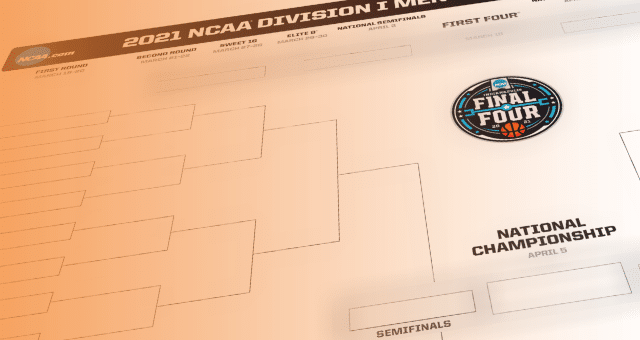Between Selection Sunday and the tip-off of Friday’s games, Americans will fill out roughly 70 million March Madness brackets, guided by a mix of faith, hope, intuition, knowledge and … a few behavioral biases that inevitably creep into our decisions.
Those same biases can also negatively influence your investment choices. In the spirit of the season, this blog shares a few common behavioral biases that affect decision making, with examples of how they affect your March Madness choices and your investments.
Recognizing Cognitive Limits and Emotional Bias
There are two main types of bias that affect our decisions: cognitive and emotional. Cognitive errors result from faulty reasoning. Some of the most common cognitive errors include:
- Representative Bias: Assessing new information based on past experiences.
Examples: When filling out your March Madness bracket, perhaps you avoid picking a top-seeded team because they let you down in the past. But last year’s tournament has no bearing on future results.When investing, representative bias may steer you away from an asset class or style box that underperformed in recent years. For example, value stocks underperformed growth stocks since the financial crisis, so it might be tempting to steer your allocation more heavily toward growth investments. This bias can keep you from being diversified and cause you to miss out on the next top-performing asset class.
- Confirmation Bias: Looking for and/or using only the information that confirms your view while disregarding conflicting data.
Examples: When it comes to the tournament, maybe you have a hunch that a particular 12 seed will upset a 5. But are you only focusing on that 12 seed’s impressive regular season wins, and ignoring its embarrassing losses? If so, you may be falling victim to confirmation bias.It’s easy for the same bias to affect your investment choices. There is no shortage of financial resources. If you are only reading the positive articles you want to believe and ignoring the warning signs from others, confirmation bias may steer you toward a riskier investment than you realize.
- Recency Bias: Placing greater importance on the most recent event.
Examples: Recency bias occurs when we weight too much significance on a team’s performance in the conference tournament preceding the big dance. Perhaps a middling team in the regular season skated through their conference tournament due to some good fortune and upsets of other teams in the bracket. That success does not necessarily portend a long run in the next tournament.For investors, recency bias occurs when we favor, and overweight, an asset class based on the most recent results. For example, you may think you only need exposure to U.S. stocks, since they have outperformed international stocks over the past decade. This overlooks the fact that U.S. stocks returned nothing from 2000 to 2010.
Emotional Errors
Emotional errors arise from personal feelings and are manifested subconsciously, making them hard to combat. Some of the most challenging emotional errors are:
- Loss Aversion: Focus on avoiding losses, regardless of true cost.
Examples: Our fear of avoiding a loss causes some basketball fans to favor the top seeds in the bracket too much. It’s not always the worst strategy – those teams are a top seed for a reason – but to win your bracket competition, you’ll likely have to go out on a limb and predict a few upsets.Loss aversion can also undermine an investment portfolio. If you are unable to accept the risk that comes with the stock market, you may invest only in less-risky bonds. While those bonds are not likely to experiences losses, you are probably sacrificing the portfolio growth needed to achieve your long-term retirement objectives.
- Overconfidence (Illusion of Knowledge): Thinking you know more than you do.
Examples: When making March Madness selections, overconfidence may show itself in your belief in a select conference. Perhaps you went to an ACC school, and believe it is a superior basketball conference, so you predominantly pick ACC schools to win games.For investors, overconfidence can manifest itself in many ways. Perhaps you’ve inherited company stock options from your employer. Given your confidence in the business, you simply keep collecting those options without diversifying into other opportunities or assessing whether the value of those options alone can fund your retirement needs.
- Status Quo: Getting complacent about what you currently own.
Examples: The March Madness equivalent to status quo is sticking with those “blue blood” basketball schools that are traditional stalwarts, even though the current team may not be as strong.When managing wealth, status quo means sticking to what’s already worked. For instance, after U.S. stocks experienced the strongest gains over the past decade, it may be tempting to leave yourself overexposed to that market, instead of rebalancing the portfolio toward international or emerging markets. The decision to stay put could leave you underexposed to other markets at precisely the wrong time.
- Herd Mentality Bias: The tendency to follow what other investors are doing.
Examples: If you are picking the same number one seed to win the championship that every pundit is picking, you’re probably herding. And while there is a decent chance that team may win, your bracket likely won’t be differentiated enough to take home your bracket contest prize.In the investment world, examples of herding run the gamut. An investor may see friends buying properties to take advantage of a hot real estate market, then purchase their own second home even though it may be out of their means or the market is overheated.
Learn more
Read our paper,
Don't Bust Your Bracket This March Take Some Cues From Behavioral Investing



